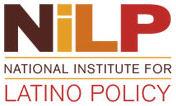
National Latino Opinion Leaders Survey
Latino Opinion Leaders on President Obama and Latino Leadership
The NiLP Latino Policy & Politics Report (April 20, 2015)
With less than two years left in his administration and the 2016 Presidential election beginning to heat up, the Latino opinion leaders weighed in on their assessment of the President's performance. Related to this they also identified whom they feel are the most politically influential Latinos nationally.
These findings are from the results of the National Latino Opinion Leaders Survey conducted by the National Institute for Latino Policy (NiLP) over the Internet during the period April 6-13, 2015. It is a survey of 345 of the subscribers to The NiLP Latino Policy & Politics Report. The responses to this poll were all anonymous.
President Obama. The Latino opinion leaders' approval of President Obama was mixed. In general they gave the President high marks, but when asked about his track record on Latino issues, they largely disapproved of his performance.
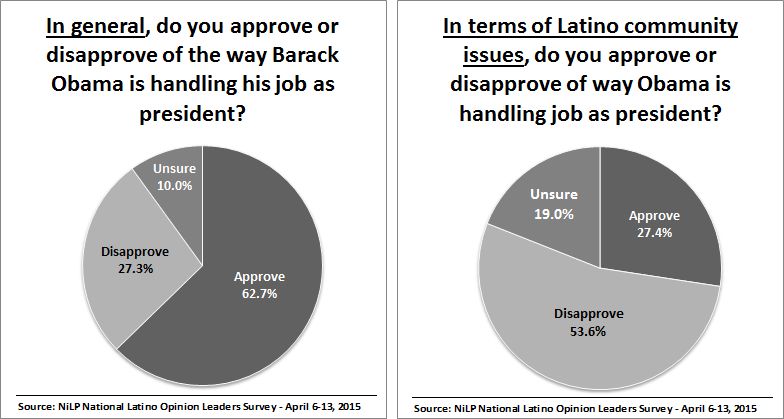
However, even with the low marks Obama received on his handling of Latino issues as President, the Latino opinion leaders approve more of the performance of the President in comparison to the lower mark they give the Supreme Court (23 percent) and almost non-approval of the role of the Congress (3 percent).
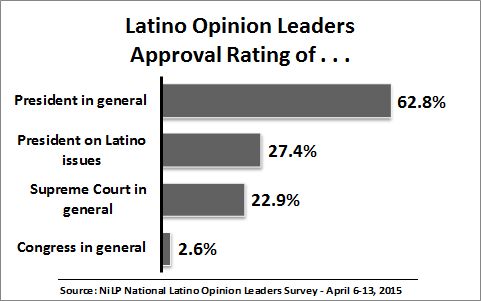
On whether the Obama Administration has been inclusive of Latino, the majority of the Latino opinion leaders (57 percent) feel it is not adequately inclusive of their community.
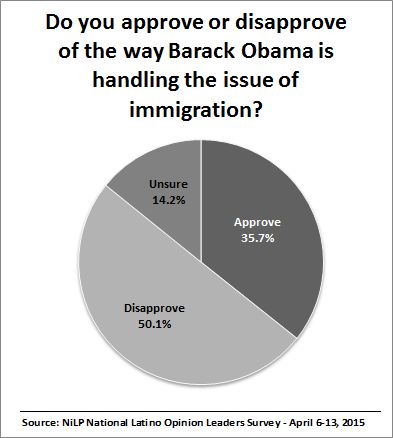 President Obama and Immigration.
The President's decision to use executive action to delay the deportation
if undocumented immigrants have been controversial and is in the midst
of litigation in the federal courts. While seen by his political opponents
as a result of his pandering to Latinos, it is interesting that half of
the Latino opinion leaders (50 percent) do not approve of his handling
of immigration.
President Obama and Immigration.
The President's decision to use executive action to delay the deportation
if undocumented immigrants have been controversial and is in the midst
of litigation in the federal courts. While seen by his political opponents
as a result of his pandering to Latinos, it is interesting that half of
the Latino opinion leaders (50 percent) do not approve of his handling
of immigration.
Asked why they believe the President has taken executive action on immigration, 34 percent feel he is doing it mostly to help the Democratic Party, 22 percent mostly to address the immigration issue, and 37 percent to do both.
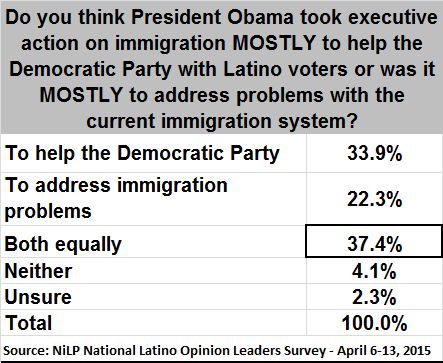
Most of the Latino opinion leaders (84 percent) feel that the President is acting within the authority he has in taking executive action on immigration. Only 12 percent feel he is acting beyond his authority.
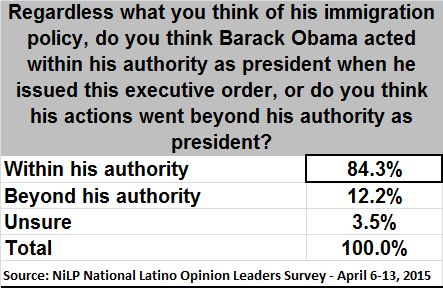
Most Influential Latinos. Continuing this topic of leadership, the Latino opinion leaders were asked to identify whom they consider the most influential Latinos in the United States. Only five receive 4 percent of more recognition, with the largest percentage (28 percent) indicating that there are none they could identify as influential. By far considered the most influential is U.S. Supreme Court Associate Justice Sonia Sotomayor (by 21 percent), followed by Chicago Congressman Luis Gutierrez (10 percent), Florida U.S. Senator Marco Rubio (10 percent), HUD Secretary Julian Castro (5 percent) and Texas U.S. Senator Ted Cruz (4 percent). Another 26 names were mentioned, totaling together 21 percent, but none by more than 2 percent.
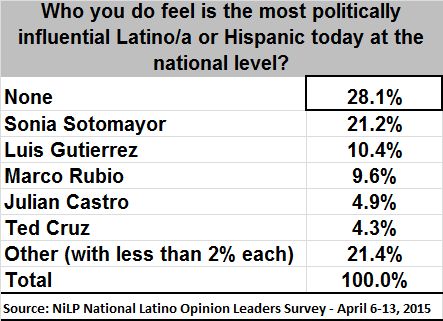
There were inportant differences in the identification of the most influential Latinos by national-origin. The Latino opinion leaders who are Mexican-American, by far the largest Latino subgroup, identified the largest number of influential leaders, the largest percentage mentioning Sotomayor 17 percent), followed by Julian Castro (12 percent), Marco Rubio (10 percent), Gutierrez (6 percent) and Cruz (4 percent). The largest percentage (35 percent) could not identify any influential Latinos. It is also interesting that of the top five they identified, only one is Mexican-American, and he appears last on that list.
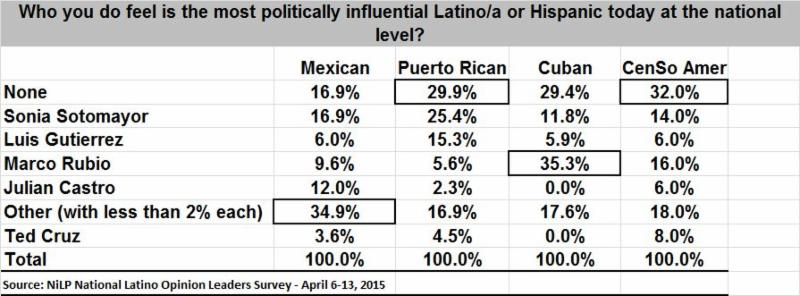
The Latino opinion leaders of the next largest Latino group, Puerto Ricans, identified two Puerto Ricans as being most influential --- Sotomayor (25 percent) and Gutierrez (15 percent). However, the largest percentage of the Puerto Ricans (30 percent) couldn't identify any influential Latinos. Among the Cuban opinion leaders, a much smaller part of the Latino population, more than a third (35 percent) identified Rubio but none mentioned Cruz. More than a quarter (29 percent) of the Cuban opinion leaders could not identify an influential Latino.
There were gender and age factors in the identification of most influential Latinos. Among the female Latina opinion leaders, the top choice (by 31 percent) was Sotomayor. Who was mentioned by only 15 percent of the men? Among the younger Latino opinion leaders, younger than 50, Sotomayor was their top choice (by 21 percent), but closely followed by Marci Rubio 18 percent) and Julian Castro (15 percent), the latter being the younger members of the list of influentials. Among the older Latino opinion leaders (over 50 year of age), the largest percentages could not identify any influential Latino (31 percent). These older Latino opinion leaders mentioned Sotomayor as most influential (by 19 percent).
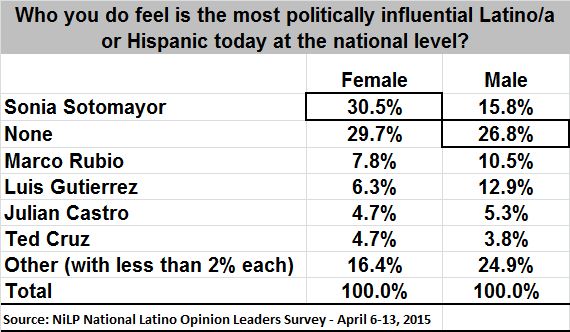
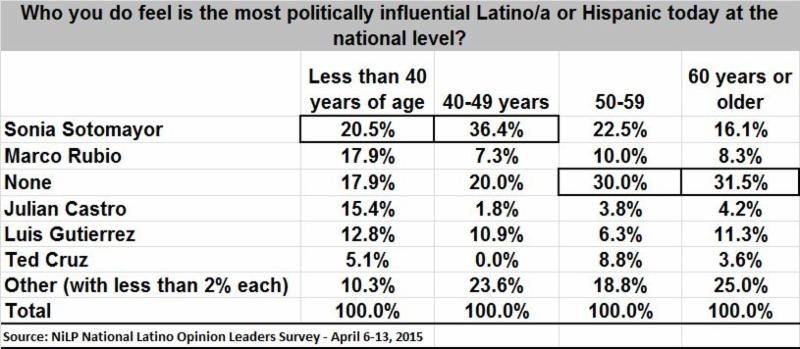
Because this list of Latino influentials is made up mostly of party activists, the role of political party affiliation by the Latino opinion leaders is important in their identification of the most influential Latinos. Among the Democrats, their top choice is Sotomayor (26 percent) while for the Republicans it is Rubio (39 percent). Among the independents, a third (33 percent) could not identify any Latino influentials.
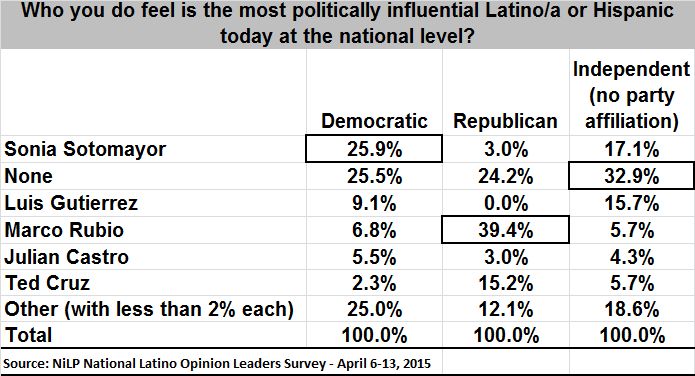
The Senator Menendez Case. New Jersey U.S. Senator Robert Menendez is an important player in national politics. He has recently been indicted for political corruption by the federal government. In light of these circumstances, the Latino opinion leaders were asked if they feel he should resign from the Senate.
The largest percentage of the Latino opinion leaders (42 percent) believe that Senator Menendez should resign from his post. This position was shared in roughly the same proportion of Democrats and Republicans, with a plurality of independents (46 percent) feeling he should not resign. In contrast, 63 percent of the Latino opinion leaders from Menendez' home state, New Jersey, do not believe he should resign.

There were also differences on this question based on the respondent's general political orientation. While pluralities of Moderates (42 percent), Liberals (48 percent) and Progressives (43 percent) feel that he should resign, a large majority (62 percent) of conservatives feel he should not.

Discussion
While the Latino opinion leaders give Obama high marks in approving his handling of the job of President in general terms, his role on Latino issues is seen by them as highly disappointing. These opposing positions on the performance of the same individual reveal the different levels at which this country's leadership is assessed. This points to the reality that this assessment exists at different levels of abstraction, in this case of a generalize public and of a specific racial-ethnic community. This presents a challenge for the interpretation of public opinion when generally posed as do most polls today in weighing their value in comparison with more particularized versions.
The Latino opinion leaders responses to questions about the Obama Administration's inclusiveness of Latinos and his handling of the immigration issues are, for the most part, negative.
A recurring issue in Latino politics is the pervasive disappointment about the state of leadership in this community. This is also the case for leadership in the United States as w whole. The election of the first African-American President raised expectations in the Latino community about the possibilities of more responsive national policies and politics. According to the Latino opinion leaders, with less than two years left in his second term, the Obama Administration has been a disappointment as well as far as Latino concerns are involved. They point to the long-term problem of Latinos being the most underrepresented group in the federal government work force (17 percent of the country's population, but only 8 percent of federal employees). Their negative and largely cynical view of Obama's handling of immigration issues may be surprising to some outside of the Latino community because of the charge that his resorting to executive action delay deportations was his pandering to Latino voters. It seems clear that his failure to address the need for comprehensive immigration reform early in his Administration is still a sore point for Latino leaders. The question for the 2016 election is whether this Latino resentment will be limited to Obama or to the Democratic Party and its next candidate for President.
The identification of the most politically influential Latinos in the country by the Latino opinion leaders raises many areas of concern. The most obvious problem is the inability of the largest percentage of them not being able to identify what they consider a politically influential Latino. This was particularly pronounced among the older Latino opinion leaders.
The other problem this listing raises is the apparent equation of political influence with a person's media exposure. Associate Justice Sotomayor is frequently in the media, but her influence is more legal than strictly political. The appearance of conservative Republicans like Marco Rubio and Ted Cruz so high on this list of influential Latinos is interesting in that the large majority of the Latino opinion leaders are liberal-to-left Democrats, indicating the role that media exposure seems to play in their definition of political influence. This also indicates gains being made by conservative Republicans in their outreach to the Latino community, although a few of the Latino opinion leaders who identified Rubio or Cruz qualified their selection with adverbs like "unfortunately" and "sadly."
In addition to any major consensus on who are the most influential Latinos, there were also significant differences in their ranking based on a number of factors, such as national-origin, gender, party affiliation, and age. This indicates a further diffusion of leadership at the national level. Whether this is important or not remains subject to debate in that there are proponents for such as decentralized leadership against those who promote the "Al Sharpton-model" of a high-profile charismatic leader.
On the issue of leadership, the federal charges of corruption against U.S. Senator Bob Menendez of New Jersey, a Cuban-American, has raised the question of whether he should resign or not from the Senate. An influential player in Washington politics, it is interesting that his current troubles have resulted in the Latino opinion leaders rarely mentioning his name as an influential in this survey. The largest percentage of the Latino opinion leaders feel that he should resign, but a significant percentage feel he should not. The Latino opinion leaders feeling that he should not resign are those who are politically conservative and those who are not affiliated with any political party; the others are calling on him to resign. The Menendez case represents the challenges that Latino political leadership is currently confronting about their effectiveness and ethics.
Methodology
This is based on respondents from the influential online national information network of the National Institute for Latino Policy that represents a broad cross-section of Latino opinion leaders throughout the United States, Puerto Rico, and the US Virgin Islands. These are made up of elected officials, government officials, heads of community-based organizations and national advocacy groups, religious leaders, business leaders, academics and others. Through our National Latino Opinion Leaders Survey, we poll this group from time to time on important issues facing the Latino community given this stratum's important role in Latino agenda-setting and framing.
This is based on respondents from the influential online national information network of the National Institute for Latino Policy that represents a broad cross-section of Latino opinion leaders throughout the United States, Puerto Rico, and the US Virgin Islands. These are made up of elected officials, government officials, heads of community-based organizations and national advocacy groups, religious leaders, business leaders, academics and others. Through our National Latino Opinion Leaders Survey, we poll this group from time to time on important issues facing the Latino community given this stratum's important role in Latino agenda-setting and framing.
While the polling that is being conducted on Latino issues by the media and polling organizations is of the broader community, this more select group of opinion leaders has a unique place from which to view these questions within our community. While not a scientifically generated sample of Latino elites, we expect this survey will result in useful insights on the main issues facing the Latino community in New York City today. While the findings of this survey are not generalizable to the community as a whole, they represent the views of an influential set of opinion leaders within this community who help set the framework for its issues and priorities. These findings should be seen more as a heuristic device as one might take the results of a focus group.
_______________________________________________________________________________________________________
The NiLP Latino Policy & Politics Report is an online information service provided by the National Institute for Latino Policy (NiLP), edited by Angelo Falc?n. For further information, visit www.latinopolicy.org or contact editor@latinopolicy.org.
Related
National Latino Opinion Leaders Survey: April 2015
Part 1: The 2016 Presidential Election
Part 2: Public Policy Issues
Part 3: U.S.-Latin American Relations
